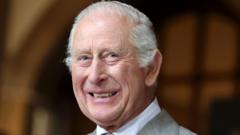King Charles III's historic visit to Canada highlights the ongoing dialogue concerning Canadian sovereignty, particularly in light of recent comments from former President Donald Trump suggesting that Canada should be part of the United States. During his address in Ottawa, the King is expected to openly celebrate and assert Canadian independence, a sentiment echoed by Jeremy Kinsman, a former Canadian high commissioner to the UK.
As the first monarch to open Canada's Parliament since Queen Elizabeth II in 1957, Charles’ speech will be closely scrutinized for its tone and content. It will be delivered in both French and English, encapsulating the country's dual linguistic heritage, and likely include personal remarks from the King to connect with Canadians more directly. Many anticipate that his message will underscore the importance of Canadian sovereignty, particularly in a political climate marked by increasing pressure from the US.
Experts predict that the King's address will emphasize the need for Canada to maintain its independence, particularly given the pro-Canadian stance of Prime Minister Mark Carney. Kinsman expresses confidence that the King will advocate for Canadian governance while delicately balancing diplomatic relations with the US.
Mel Cappe, a former cabinet minister, notes the anticipated personal touch in the King's speech, suggesting it may start with a few paragraphs reflecting his views before transitioning to policy matters endorsed by his advisers. While there is a desire for the King to champion Canadian values, challenges arise from the complexity of international relations; King Charles is caught in a diplomatic balancing act between the UK and its neighbor to the south.
Professor Cappe predicts that the royal visit could be a significant moment, with public anticipation surrounding the King's remarks that may include assertive affirmations like “never” when reiterating Canada's autonomy. Kinsman emphasizes the profound emotional impact felt by Canadians in response to Trump's comments, recognizing that many feel insulted and concerned about their identity on the world stage.
As King Charles prepares for this pivotal moment, the expectations from both sides of the border highlight a unique intersection of culture, diplomacy, and identity that shapes Canada’s relationship with its sovereignty and the international community. For many Canadians, this visit is an opportunity for the monarchy to express solidarity and support for their national pride in the face of uncertainty.
The upcoming ceremony also serves as a moment for reflection on Canada's First Nations communities, who have long sought recognition and respect in discussions about sovereignty and governance, underscoring the multifaceted nature of Canadian identity that will likely influence the King's speech.
In a world where alliances are shifting and public sentiment is deeply influenced by political rhetoric, all eyes will be on King Charles III to see how he navigates this complex diplomatic landscape while advocating for the identity of Canada as a proud, independent nation.



















